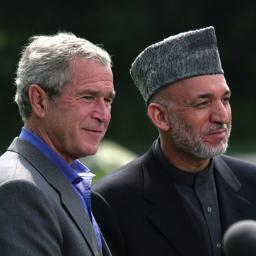On Monday, Presidents Bush and Karzai concluded their Camp David meeting with a press conference at which they stood united on every major issue. By Thursday, the bloom was off the rose: In a snub to both Bush and Karzai, Pakistan's President Musharraf backed out of a tribal assembly that the United States had orchestrated, and a British commander made headlines when he said America's counterinsurgency operations are undermining NATO's efforts. Not once during their eight meetings over five years have the two presidents faced such challenges at home. Karzai finds his once-meteoric popularity waning in the face of his perceived inability to blunt the Taliban insurgency or rein in corruption within his government. Karzai still has popular support (his approval ratings are roughly double those of Bush) but his opponents now include reformers and moderates as well as Islamists, traditionalists, and militia leaders. Because Karzai has no power base of his own, and his authority is rooted in the public's perception that he is a rainmaker among foreign patrons, the president understands the importance of demonstrating that he enjoys the administration's full support. Nevertheless, on important issues of policy, rifts are becoming evident between Afghanistan and the United States. Karzai and Bush part ways on several issues in particular:
Bush and Karzai Show Signs of Divergence on Key Issues

